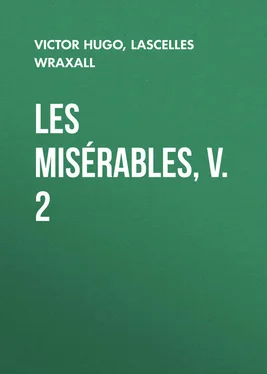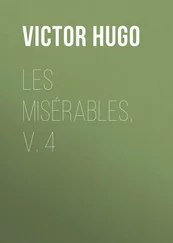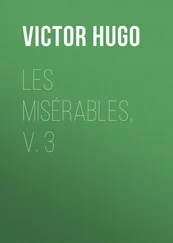Lascelles Wraxall - Les Misérables, v. 2
Здесь есть возможность читать онлайн «Lascelles Wraxall - Les Misérables, v. 2» — ознакомительный отрывок электронной книги совершенно бесплатно, а после прочтения отрывка купить полную версию. В некоторых случаях можно слушать аудио, скачать через торрент в формате fb2 и присутствует краткое содержание. Жанр: literature_19, foreign_antique, foreign_prose, на английском языке. Описание произведения, (предисловие) а так же отзывы посетителей доступны на портале библиотеки ЛибКат.
- Название:Les Misérables, v. 2
- Автор:
- Жанр:
- Год:неизвестен
- ISBN:нет данных
- Рейтинг книги:5 / 5. Голосов: 1
-
Избранное:Добавить в избранное
- Отзывы:
-
Ваша оценка:
- 100
- 1
- 2
- 3
- 4
- 5
Les Misérables, v. 2: краткое содержание, описание и аннотация
Предлагаем к чтению аннотацию, описание, краткое содержание или предисловие (зависит от того, что написал сам автор книги «Les Misérables, v. 2»). Если вы не нашли необходимую информацию о книге — напишите в комментариях, мы постараемся отыскать её.
Les Misérables, v. 2 — читать онлайн ознакомительный отрывок
Ниже представлен текст книги, разбитый по страницам. Система сохранения места последней прочитанной страницы, позволяет с удобством читать онлайн бесплатно книгу «Les Misérables, v. 2», без необходимости каждый раз заново искать на чём Вы остановились. Поставьте закладку, и сможете в любой момент перейти на страницу, на которой закончили чтение.
Интервал:
Закладка:
Still the English army was the worse of the two; the furious attacks of these great squadrons with their iron cuirasses and steel chests had crushed their infantry. A few men round the colors marked the place of a regiment, and some battalions were only commanded by a captain or a lieutenant. Alten's division, already so maltreated at La Haye Sainte, was nearly destroyed; the intrepid Belgians of Van Kluze's brigade lay among the wheat along the Nivelles road: hardly any were left of those Dutch Grenadiers who, in 1811, fought Wellington in Spain, on the French side, and who, in 1815, joined the English and fought Napoleon. The loss in officers was considerable; Lord Uxbridge, who had his leg interred the next day, had a fractured knee. If on the side of the French, in this contest of the cuirassiers, Delord, l'Heretier, Colbert, Duof, Travers, and Blancard were hors de combat , on the side of the English, Alten was wounded, Barnes was wounded, Delancey killed, Van Meeren killed, Ompteda killed, Wellington's staff decimated, – and England had the heaviest scale in this balance of blood. The 2d regiment of foot-guards had lost five lieutenant-colonels, four captains, and three ensigns; the first battalion of the 30th had lost twenty-four officers, and one hundred and twelve men; the 79th Highlanders had twenty-four officers wounded, and eighteen officers and four hundred and fifty men killed. Cumberland's Hanoverian Hussars, an entire regiment, having their Colonel Hacke at their head, who at a later date was tried and cashiered, turned bridle during the flight and fled into the forest of Soignies, spreading the rout as far as Brussels. The wagons, ammunition trains, baggage trains, and ambulance carts full of wounded, on seeing the French, gave ground, and approaching the forest, rushed into it; the Dutch, sabred by the French cavalry, broke in confusion. From Vert Coucou to Groenendæl, a distance of two leagues on the Brussels roads, there was, according to the testimony of living witnesses, a dense crowd of fugitives, and the panic was so great that it assailed the Prince de Condé at Mechlin and Louis XVIII. at Ghent. With the exception of the weak reserve échelonned behind the field hospital established at the farm of Mont St. Jean, and Vivian's and Vandeleur's brigades, which flanked the left wing, Wellington had no cavalry left, and many of the guns lay dismounted. These facts are confessed by Siborne; and Pringle, exaggerating the danger, goes so far as to state that the Anglo-Dutch army was reduced to thirty-four thousand men. The Iron Duke remained firm, but his lips blanched. The Austrian commissioner Vincent, and the Spanish commissioner Alava, who were present at the battle, thought the Duke lost; at five o'clock Wellington looked at his watch, and could be heard muttering, "Blücher or night!"
It was this moment that a distant line of bayonets glistened on the heights on the side of Frischemont. This was the climax of the gigantic drama.
CHAPTER XI
BÜLOW TO THE RESCUE
Everybody knows Napoleon's awful mistake; Grouchy expected, Blücher coming up, death instead of life. Destiny has such turnings as this: men anticipate the throne of the world, and perceive St. Helena. If the little shepherd who served as guide to Bülow, Blücher's lieutenant, had advised him to debouche from the forest above Frischemont, instead of below Plancenoit, the form of the 19th century would have been different, for Napoleon would have won the battle of Waterloo. By any other road than that below Plancenoit the Prussian army would have come upon a ravine impassable by artillery, and Bülow would not have arrived. Now one hour's delay – the Prussian general Muffling declares it – and Blücher would not have found Wellington erect, – "the battle was lost." It was high time, as we see, for Bülow to arrive, and as it was he had been greatly delayed. He had bivouacked at Dion-le-Mont and started at daybreak but the roads were impracticable, and his divisions stuck in the mud. The ruts came up to the axle-tree of the guns; moreover, he was compelled to cross the Dyle by the narrow bridge of Wavre: the street leading to the bridge had been burned by the French, and artillery train and limbers, which could not pass between two rows of blazing houses, were compelled to wait till the fire was extinguished. By mid-day Bülow's vanguard had scarce reached Chapelle Saint Lambert.
Had the action begun two hours sooner, it would have been over at four o'clock, and Blücher would have fallen upon the battle gained by Napoleon. At mid-day, the Emperor had been the first to notice through his telescope, on the extreme horizon, something which fixed his attention, and he said, "I see over there a cloud which appears to me to be troops." Then he asked the Duke of Dalmatia, "Soult, what do you see in the direction of Chapelle Saint Lambert?" The Marshal, after looking through his telescope, replied, "Four or five thousand men, Sire." It was evidently Grouchy; still they remained motionless in the mist. All the staff examined the cloud pointed out by the Emperor, and some said, "They are columns halting;" but the majority were of opinion that they were trees. The truth is that the cloud did not move, and the Emperor detached Doncoul's division of light cavalry to reconnoitre in the direction of this dark point.
Bülow, in fact, had not stirred, for his vanguard was very weak and could effect nothing. He was obliged to wait for the main body of the army, and had orders to concentrate his troops before forming line; but at five o'clock, Blücher, seeing Wellington's danger, ordered Bülow to attack, and employed the remarkable phrase, "We must let the English army breathe." A short time after, Losthin's, Hiller's, Hacke's, and Ryssel's brigades deployed in front of Lobau's corps, the cavalry of Prince William of Prussia debouched from the Bois de Paris, Plancenoit was in flames, and the Prussian cannon-balls began pouring even upon the ranks of the guard held in reserve behind Napoleon.
CHAPTER XII
THE GUARD
The rest is known, – the irruption of a third army; the battle dislocated; eighty-six cannon thundering simultaneously; Pirch I. coming up with Bülow; Ziethen's cavalry led by Blücher in person: the French driven back; Marcognet swept from the plateau of Ohain; Durutte dislodged from Papelotte; Donzelot and Quiot falling back; Lobau attacked on the flank; a new battle rushing at nightfall on the weakened French regiments; the whole English line resuming the offensive, and pushed forward; the gigantic gap made in the French army by the combined English and Prussian batteries; the extermination, the disaster in front, the disaster on the flank, and the guard forming line amid this fearful convulsion. As they felt they were going to death, they shouted, "Long live the Emperor!" History has nothing more striking than this death-rattle breaking out into acclamations. The sky had been covered the whole day, but at this very moment – eight o'clock in the evening – the clouds parted in the horizon, and the sinister red glow of the setting sun was visible through the elms on the Nivelles road. It had been seen to rise at Austerlitz.
Each battalion of the Guard, for this dénouement , was commanded by a general; Friant, Michel, Roguet, Harlot, Mallet, and Pont de Morvan were there. When the tall bearskins of the Grenadiers of the Guard with the large eagle device appeared, symmetrical in line, and calm, in the twilight of this fight, the enemy felt a respect for France; they fancied they saw twenty victories entering the battlefield with outstretched wings, and the men who were victors, esteeming themselves vanquished, fell back; but Wellington shouted, "Up, Guards, and take steady aim!" The red regiment of English Guards, which had been lying down behind the hedges, rose; a storm of canister rent the tricolor flag waving above the heads of the French; all rushed forward, and the supreme carnage commenced. The Imperial Guard felt in the darkness the army giving way around them, and the vast staggering of the rout: they heard the cry of "Sauve qui peut!" substituted for the "Vive l'Empereur!" and with flight behind them they continued to advance, hundreds falling at every step they took. None hesitated or evinced timidity; the privates were as heroic as the generals, and not one attempted to escape suicide.
Читать дальшеИнтервал:
Закладка:
Похожие книги на «Les Misérables, v. 2»
Представляем Вашему вниманию похожие книги на «Les Misérables, v. 2» списком для выбора. Мы отобрали схожую по названию и смыслу литературу в надежде предоставить читателям больше вариантов отыскать новые, интересные, ещё непрочитанные произведения.
Обсуждение, отзывы о книге «Les Misérables, v. 2» и просто собственные мнения читателей. Оставьте ваши комментарии, напишите, что Вы думаете о произведении, его смысле или главных героях. Укажите что конкретно понравилось, а что нет, и почему Вы так считаете.












